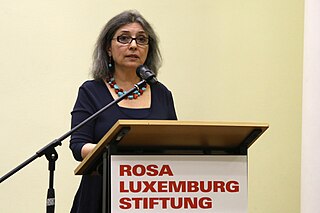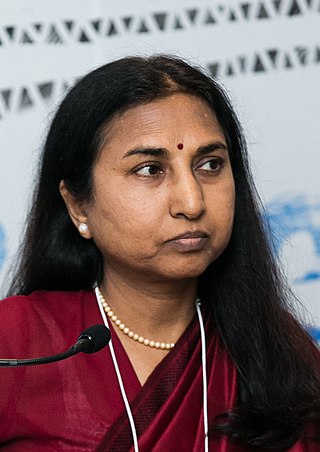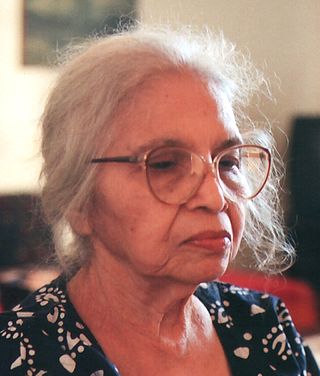Related Research Articles

Pardah or purdah is a religious and social practice of female seclusion prevalent among some Muslim and Hindu communities. It takes two forms: physical segregation of the sexes and the requirement that women cover their bodies so as to cover their skin and conceal their form. A woman who practices purdah can be referred to as pardanashin or purdahnishan. The term purdah is sometimes applied to similar practices in other parts of the world.

Devaki Jain is an Indian economist and writer, who has worked mainly in the field of feminist economics. In 2006 she was awarded the Padma Bhushan, the third-highest civilian award from Government of India, for her contribution to social justice and the empowerment of women.

Shahrzad Mojab is an academic activist and professor, teaching at the Department of Leadership, Higher and Adult Education and Women and Gender Studies Institute, at the University of Toronto. Shahrzad has been living in Canada since 1986 with her lifelong partner, colleague and comrade, Amir Hassanpour, and their son, Salah.
Maxine Deirdre Molyneux is a British sociologist whose work focuses on the women's movement.

Bina Agarwal is an Indian development economist and Professor of Development Economics and Environment at the Global Development Institute at The University of Manchester. She has written extensively on land, livelihoods and property rights; environment and development; the political economy of gender; poverty and inequality; legal change; and agriculture and technological transformation.

Diane Rosemary Elson is a British economist, sociologist and gender and development social scientist. She is Professor Emerita of sociology at the University of Essex and a former professor of development studies at the University of Manchester.
Work intensity is defined as activity in relation to the capacity for that work. It is a topic that affects developed and developing countries in different ways. There are many aspects to work intensity including multitasking, time poverty, health implications, and policy considerations. Multitasking is the overlap of many activities, usually care and informal work, that negatively impacts the livelihood of people, especially women, in the developing world. Time poverty is defined as the lack of time for leisure and rest activities after time spent working. High work intensity coupled with multitasking and time poverty has a negative correlation with health outcomes. Work intensity is seldom considered when proposing new policy and legislation. As more women enter the workforce, work intensity and its implications are being brought to the forefront of policy, development, and empowerment debates.

Martha Chen is an American academic, scholar and social worker, who is presently a lecturer in public policy at the Harvard Kennedy School and senior advisor of the global research-policy-action network WIEGO and a member of the Advisory Board of the United Nations University World Institute for Development Economics Research (UNU-WIDER). Martha is a development practitioner and scholar who has worked with the working poor in India, South Asia, and around the world. Her areas of specialization are employment, poverty alleviation, informal economy, and gender. She lived in Bangladesh working with BRAC, one of the world's largest non-governmental organizations, and in India, as field representative of Oxfam America for India and Bangladesh for 15 years.

Leela Dube was a renowned anthropologist and feminist scholar, fondly called Leeladee by many. She had been married to the renowned anthropologist and sociologist LateShyama Charan Dube. Leela Dube was the younger sister of the late classical singer Sumati Mutatkar. Her elder son Late Mukul Dube was an avid photographer. She is survived by her younger son, Saurabh Dube. Known for her work on kinship and in women's studies, she wrote several books including Matriliny and Islam: religion and society in the Laccadives and Women and kinship: comparative perspectives on gender in South and South‑east Asia.
The term patriarchal bargain describes the strategies women employ to gain a greater degree of security and autonomy within the bounds of their sex-based oppression. Different forms of patriarchal oppression necessitate tailored patriarchal bargains, thus the concept can be used to reveal the particular dimensions of patriarchy in its various modalities across societies and cultures. The term was coined by Turkish author and researcher Deniz Kandiyoti in her 1988 article, "Bargaining with Patriarchy", which appeared in the September issue of Gender & Society. Sociologist Lisa Wade states that patriarchal bargain is "an individual strategy designed to manipulate the system to one’s best advantage, but one that leaves the system itself intact."
Naila Kabeer is an Indian-born British Bangladeshi social economist, research fellow, writer and Professor at the London School of Economics. She was also president of the International Association for Feminist Economics (IAFFE) from 2018 to 2019. She is on the editorial committee of journals such as Feminist Economist, Development and Change, Gender and Development, Third World Quarterly and the Canadian Journal of Development Studies. She works primarily on poverty, gender and social policy issues. Her research interests include gender, poverty, social exclusion, labour markets and livelihoods, social protection, focused on South and South East Asia.

Yana van der Meulen Rodgers is a professor in the Department of Labor Studies and Employment Relations in the School of Management and Labor Relations at Rutgers University,. She also serves as Faculty Director of the Center for Women and Work at Rutgers.

Farida Shaheed is a Pakistani sociologist and feminist human rights activist. In 2012, she was appointed the United Nations Special Rapporteur in the field of cultural rights, while she held that role in the field of education from 2022. She heads the Shirkat Gah women's resource centre in Pakistan, and is known for her extensive work on gender and class analysis, both in Pakistan and more globally.

Shahra Razavi is an Iranian-born academic and senior United Nations official specialising in gender and social development. A graduate of the London School of Economics and Oxford University, Razavi is currently Director of the Social Protection Department of the International Labour Organisation in Geneva, Switzerland.
Yakin Ertürk is a Turkish former United Nations special rapporteur on violence against women and board member of the United Nations Research Institute for Social Development (UNRISD), and was a professor of Sociology.
Nükhet Sirman is a Turkish social anthropologist. She earned a doctorate degree from Britain's University College London in 1988, and since 1989, she is a professor of anthropology at the Boğaziçi University in Istanbul, Turkey. She has done academic analysis of the feminist movement in Turkey and introduced the concept of "familial citizenship" in the academic realm.
Carmen Diana Deere is an American feminist economist who is an expert on land policy and agrarian reform, rural social movements, and gender in Latin American development. She has conducted extensive research on access to land, economic autonomy of rural women, and property rights in Latin America. Deere's research and work, often carried out with Magdalena León de Leal, have contributed to promoting the changes that have taken place since 1980 in the vast majority of countries in Latin America with respect to the reform of land laws, civil codes, and family matters, as well as the approval of new legislation that recognizes the equal rights of women and men, including their property rights. Deere is Professor Emeritus of Latin American studies and Food Resources Economics at the University of Florida and Professor Emeritus of FLACSO-Ecuador. She was honored with the Silvert Award in 2018.
Feride Acar is a Turkish international expert on women and gender. She was the founding chair of the Middle East Technical University's gender and women's studies program. Between 2003 and 2005 served as chair of the Committee on the Elimination of Discrimination against Women and served three consecutive terms as president of the Council of Europe's Group of Experts of Action against Violence against Women and Domestic Violence (GREVIO). In 2019, she was awarded the Pro Merito Medal of the Council of Europe for her service to that body in advancing women's rights.
Niraja Gopal Jayal is an Indian political scientist, who works on issues concerning citizenship, representation, and democracy. She is currently a professor at both, King's College London and the London School of Economics, in the United Kingdom, and previously taught at the Jawaharlal Nehru University in New Delhi, India.
References
- ↑ "Kandiyoti, Deniz". Library of Congress. Retrieved 4 November 2014.
data sheet (b. 3/15/44)
- ↑ "Professor Deniz Kandiyoti, SOAS Department of Development Studies" . Retrieved 3 November 2013.
- ↑ School for Oriental and Asian Studies. (2007). “Staff: Deniz Kandiyoti” Archived 2004-12-26 at the Wayback Machine
- 1 2 3 4 Hammami, Rema (November 2006). "Deniz Kandiyoti". Development and Change, FORUM 2006. 37 (6): 1347–1354. doi: 10.1111/j.1467-7660.2006.00530.x .
- ↑ United Nations Research Institute for Social Development. 2000-2005 Research areas. Archived 4 May 2021 at the Wayback Machine
- ↑ Taylor and Francis Group. 2007. Journal details for Central Asian Survey.